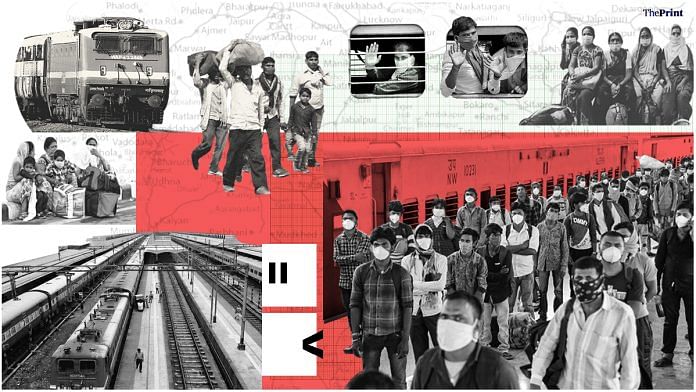Indian railways will reopen limited passenger services from 12 May, with 15 special trains departing from Delhi. Online bookings started Monday. So far, 2,215 Indians have died due to coronavirus with more than 4,000 new Covid-19 positive cases reported in the last 24 hours. Union civil aviation minister Hardeep Singh Puri said India is prepared to also start air travel as soon as the Centre gives its nod.
ThePrint asks: Railways to resume: Is India beginning to learn to live with the coronavirus?
Railways should have testing facilities, limited occupancy. This should have been done before lockdown
 Keshav Desiraju
Keshav Desiraju
Former health secretary
India has to learn to live with the coronavirus. Road and rail travel will have to start, but in a graded and careful manner, with limited occupancy, testing both at the start and end of the journey and possible quarantine facilities at the destination.
This should actually have been done before lockdown, when the spread was still containable. Now after people have been forced to stay indoors without any real possibility of physical distancing, and after the virus has been incubated, we are letting people go to rural areas, which until now were less affected than the cities.
As it is, there are hundreds of new cases every day. All district hospitals near railways stations should be geared for testing and treating increased numbers.
Three categories of people need special attention, even as we relax lockdown. Infants who have missed their routine immunisation shots. Then there are the people who have been denied care in hospitals because of the overload of Covid-19 patients. Tuberculosis patients who have not received their regular medication, cancer, diabetes and hypertension patients who have not got their medicines.The third category consists of migrant labourers — they have suffered terribly, and are probably jobless, hungry and without any money. Their physical and mental health needs immediate attention.
With the gradual relaxation of lockdown, jobs in the cities will open up again. People will start returning. It is essential that physical distancing norms are enforced in workplaces. It may be more difficult to do at home.
Ideally, all passengers travelling via trains should be tested for Covid-19 but India lacks resources
 Mihir Sharma
Mihir Sharma
Economist and senior fellow at Observer Research Foundation
The restarting of the railways has not come too soon for many of those, particularly migrant workers, who want to get home. The crash of the online ticketing website — IRCTC — reveals the size of pent-up demand for travel. But from the perspective of combatting the coronavirus, it may well be in advance of the protocols necessary.
The ideal situation would be if those getting on the trains were tested in advance, but we are still vastly short of the number of tests needed for such an endeavour. China opened up its public transport to those who have the “green” code in the opaque methodology of state-sanctioned apps — but it is not clear if the Aarogya Setu app, which has more limited exposure and functionality, will work as well. There is limited social distancing mandated within the trains, but the railways has not shared any scientific basis for assuming that leaving a middle seat free is sufficient to prevent transmission of the coronavirus. Nor are there facilities at destinations for possible quarantining of the passengers.
Puzzlingly, the trains for migrants are to run at full capacity – why are those trains being given different treatment if the object is to minimise the virus’ spread? Too many questions remain.
Resuming trains a late realisation by Modi govt. By now we should have learnt to live with Covid
 Ajay Shukla
Ajay Shukla
Former member of traffic, Railway Board
The Narendra Modi government’s decision to partially resume passenger train operations seems to be a late realisation. It should have understood early that living with Covid-19 is going to be the new normal in the foreseeable future. The new coronavirus is mutating fast and hence the government’s strategy too needs to keep pace with the virus. Many have accepted that the number of deaths due to prolonged shutdowns would be higher than from the virus itself. Also, excess concentration on one disease has taken the focus away from other killer diseases, and we have no data on such deaths. The decision to restart the engine of economy and gradual normalisation of life seems sensible, provided the government knows where it intends to move.
Although Covid, even for experts, is an unchartered territory, after staying indoors for nearly two months, people want to know whether the Modi government knows what it is doing. Government’s decisions can go wrong, but taking no decision, or taking contradictory ones, are likely to be more damaging, which seems to be the case till now. Hopefully, we will soon come to know.
Indian railways has no choice but to pay the price for the sudden lockdown imposed in March
 Amir Ullah Khan
Amir Ullah Khan
Professor of Health Economics at Indian School of Public Policy
The number of people testing Covid-19 positive in India has been going up relentlessly and will continue to for at least a couple of months. What the lockdown ensured was that the numbers did not grow exponentially, but it hasn’t been able to prevent infection from growing. Another thing that the curfew achieved is large-scale unemployment.
With more than 12 crore people losing their livelihoods in urban centres, the major problem we face now is reverse migration. Thousands of people walking along railway tracks and highways in sweltering heat, for hundreds of kilometres, is a sad commentary on our governance structure and policy. It is the helpless migrants and the working class people who seem to have forced this decision on the railways to start operating again.
What we should have done in March — transporting them to their homes by running special trains and buses — we are doing now, when the coronavirus has spread far and wide. Train travel — because of compact spaces, poorly equipped pantries and complete absence of medical facilities — is fraught with all kinds of dangers that can worsen the Covid-19 pandemic.
However, it is the cheapest mode of public transport to travel long distances in India. Yes, we will keep middle berths unoccupied, do as much screening as possible at both entry and exit points, and reduce the number of stops. The railways will lose a lot of money with these measures, and what we are doing is fraught with danger, but there is clearly no choice. Indian railways has to pay the price for the sudden lockdown in March.
Also read: Is govt right to send migrants back on trains as lockdown eases & economic activity resumes?
By Pia Krishnankutty, journalist at ThePrint




It will have to. We are too poor to be baking cakes and doing yoga at home. A more consultative, collegiate style of decision making would have allowed swift dispersal of migrants to their home states, at a time when infections were in three digits nationally. For all other groups in society to prepare for an extended lockdown. The time frame of 21 days to overcome the virus did not represent the best scientific evaluation. Distractions like clapping, lighting candles, showering rose petals. This is a dirty war that will be fought in the trenches, bayonet to bayonet. More than one thousand brave policemen in Maharashtra have tested positive. The curve is nowhere near flattening. The treasury is empty. A time for serious governance.